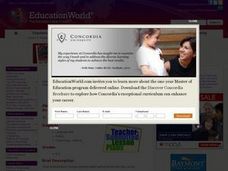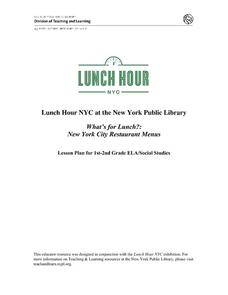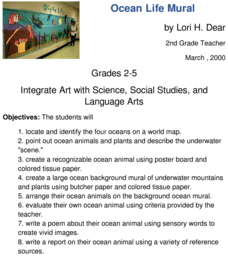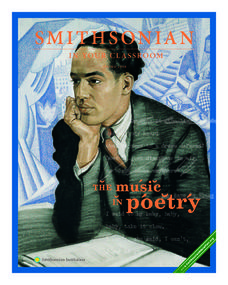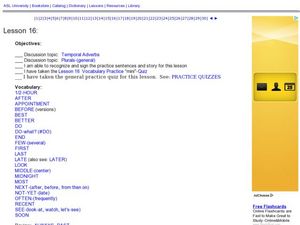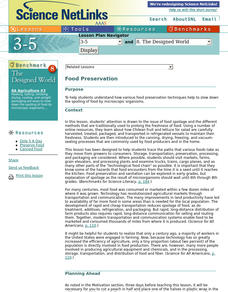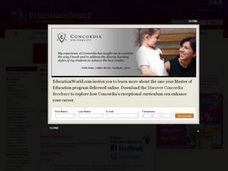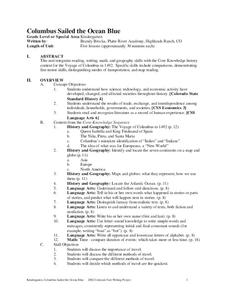Curated OER
Learning to Multiply
Learning how to multiply is the focus of this math resource. The first of five pages reviews the multiplication process as repeated addition. The second provides a few examples that you might consider working through with the class. An...
Hawaiʻi State Department of Education
Comparing Cultural Dances
All cultures express similar thoughts, feelings, and ideas. But, often times those things are expressed differently. Learners compare and contrast traditional dances from two cultures. They watch videos of each performance, stop to...
Curated OER
Abraham Lincoln- An Internet Buddy Activity
Students research the life of Abraham Lincoln. In this Abraham Lincoln lesson, students use the Internet to discover facts about his life. Students practice using Internet tools.
Curated OER
Graphic Organizer: Research Note Taking Made Easy
What do you wonder about bats? Use an open-ended question like this to engage your class and interest them in an upcoming research project. There's a list of example questions to offer or suggest regarding bats, but see what they can...
Curated OER
Nutrition and the Media: Cereal Box Consumerism
How many treats do you buy each week? Learners investigate diets and how the media tricks consumers into purchasing unhealthy snacks. They will investigate the designs and logos affiliated with cereal boxes and identify specific phrases...
New York Public Library
What's for Lunch?: New York City Restaurant Menus
Do you remember the days when a cup of coffee cost five cents? At A.W. Dennett restaurant in 1894, you could buy a five-cent cup of coffee and as well as a five-cent slice of pie to accompany it. The menu from that year is a primary...
Curated OER
Geo-Class Mapping My Neighborhood
Students create a map of the school and surrounding neighborhood. In this mapping lesson, students discover their school's location and learn about its past. Students use math skills and the steps in the design process to complete the...
Curated OER
Now That's a Problem!
Help learners improve multiplication skills by skip counting and creating their own multiplication word problems. They will begin by practicing skip counting and then illustrate word problems using a software program. Pixie is a software...
Curated OER
Ocean Life Mural
How many oceans can you name? First, have learners try to name as many oceans as they can, and then have them locate and identify the oceans on a world map. They create a recognizable ocean animal using poster board and tissue paper....
Hawaiʻi State Department of Education
Mask Symmetry
When you engage learners in creating symmetrical objects you are also building their vocabulary and math sense. Kids discuss key words such as, asymmetrical, symmetrical, balance, tint, and shade. They use these elements of design to...
Curated OER
Monster Descriptions
Monsters take center stage! Elementary schoolers are assigned to write a descriptive paragraph by a toy company to help in designing a new monster for their toy line. One student composes the paragraph, another uses that to create a...
Savvas Learning
Verbs: Past
The focus of this 38-page packet is on past tense verbs. Packed with games, activities, exercises, and drills that can be adapted to any level, the resource deserves a place in your ESL/ELD curriculum library.
Curated OER
Morning Fitness Tips
Share Morning Fitness Tips with your class, or your whole school! You will have to put time and effort into preparing your costumes and in getting together what fitness information, you want to share, but the program is a great addition...
Smithsonian Institution
Smithsonian In Your Classroom: The Music in Poetry
Take poetry off the page and put it into terms of movement, physical space and, finally, music with this series of three lessons from the Smithsonian Institution. This resource introduces students to two poetic forms that originated as...
Curated OER
ASL: Lesson 16
ASL lesson 16 covers adverbs of time, sentence structure, and asking questions. Each blue link takes you to an image, instructions, or video of the word/s being signed. Great resource!
Virginia Repertory Theatre
The Town Mouse and the Country Mouse
Accompany the story, Town Mouse Country Mouse by Jan Brett with an assortment of activities designed to reinforce concepts covering story structure, comprehension, grammar, and social studies. Here, scholars identify the difference...
Curated OER
Sorting
Students explore how books are sorted in a library. In this sorting lesson, students play a game where they have to fill the shelves with books that share a common theme. Students compare this game to a real library. Students discuss how...
Curated OER
Where Did Foods Originate? (Foods of the New World and Old World)
What do papayas, peanuts, pineapples, and potatoes have in common? Why, they are foods explorers brought back to the Old World. Young researchers use the Internet to investigate how New World explorers helped change the Old World's diet....
Curated OER
What Do Drugs Do to the Body?
Students research the effects that drugs have on the human body. Using this information, they create a poster showing some of the effects of a specific drug. They work together to summarize the information they have gathered and present...
Core Knowledge Foundation
Columbus Sailed the Ocean Blue
Young adventurers embark on a journey, setting sail along the blue ocean with Christopher Columbus. Teachers will find that this unit makes their lesson planning smooth sailing!
Curated OER
Two-Digit Addition
In this finding the sums worksheet, students use a number line to add two-digit numbers without regrouping. Students solve 20 problems.
Curated OER
Addition Without Regrouping
In this finding the sums worksheet, students use a number line to help add one-digit and two-digit numbers with no regrouping. Students solve 20 problems.
Curated OER
Telling Time
In this telling time worksheet, students use an analog clock to read the times to the nearest five minutes. Students solve 12 problems.
Curated OER
Basic Subtraction Facts
In this finding the differences worksheet, students use a number line to help fill in the missing blanks in subtraction problems. Students solve 20 problems.




